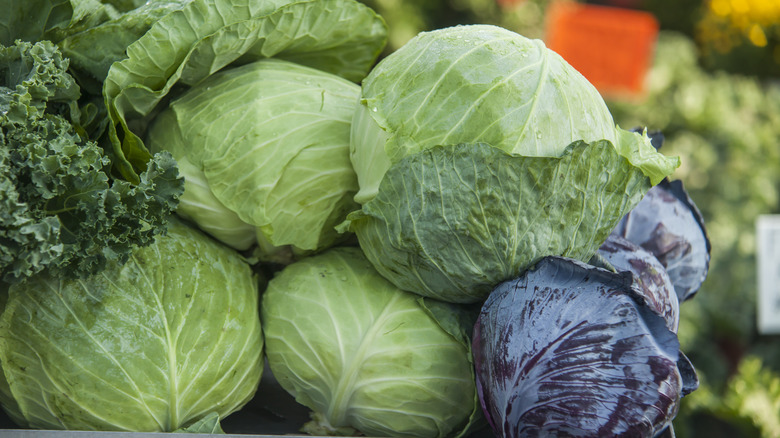Can You Freeze Cooked Cabbage For Later?
Fresh cabbage lasts a long time in the fridge. I've personally had whole heads sitting in my crisper drawer for six weeks before I hesitantly cut into them, only to find the leafy layers as crisp and green as the day I brought it home from the supermarket. After you cook it, however, storing cabbage is a whole other ball game. Of course, we all know that the freezer is a cook's best friend for extending the life of our leftovers, sometimes even getting you a few years of storage.
So, if you can store your other kinds of food in the freezer for a few months, why should (not-actually-all-that-boring) cabbage be any different? Just about any recipe that includes cabbage can safely be stored in the freezer for later, though at the risk of losing that hearty crispness. So a coleslaw or salad situation won't do well in the deep freeze, but a stew or a baking dish of cabbage rolls will certainly do well.
The secret to freezing cabbage
Although cabbage is a hearty cruciferous vegetable, it will lose some of its structure and integrity after freezing. This is because the ice crystals that form rupture the cell walls that typically keep all that moisture inside, which leads to the cells releasing all their moisture upon defrosting.
If you're freezing a recipe that uses delicious cooked cabbage, however, this should not be an issue since the heat will have similarly broken down the structure and softened it up anyway. So a soup or a stew with cabbage should be safe, but any recipe that uses raw cabbage is a no-go because of the altered texture.
The softened texture can be used to your advantage in some ways, like how you can freeze a whole head of cabbage and defrost it when making cabbage rolls. This makes the leaves easy to peel off the head and you don't have to go through the trouble of blanching it before rolling them up with filling. Most of the time, you'll want to blanch the cabbage leaves first to stretch its lifespan out as long as possible. After boiling the leaves for a short time (30 seconds to a minute), you can remove the leaves and let them cool before freezing them for up to nine months.

